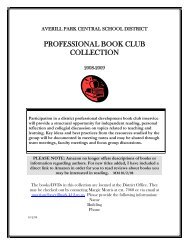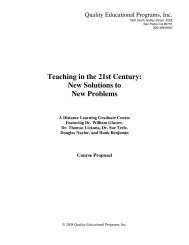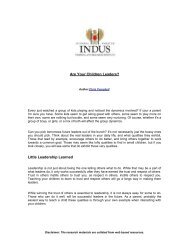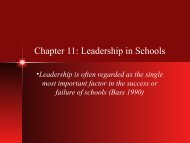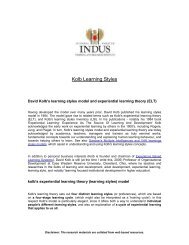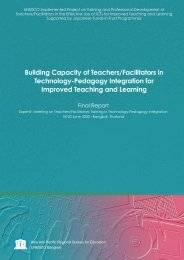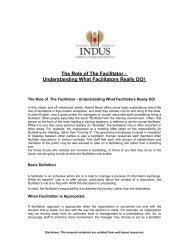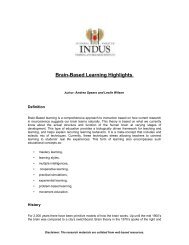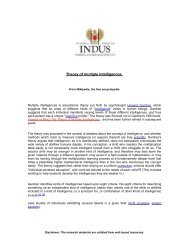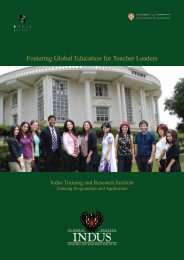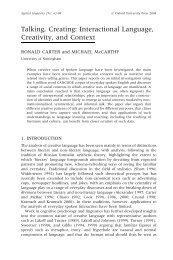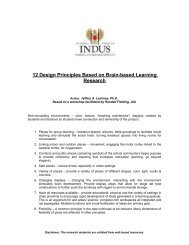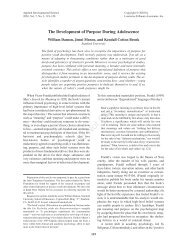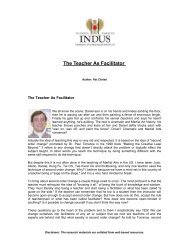Primary Years Programme Making the PYP happen - ITARI
Primary Years Programme Making the PYP happen - ITARI
Primary Years Programme Making the PYP happen - ITARI
- No tags were found...
Create successful ePaper yourself
Turn your PDF publications into a flip-book with our unique Google optimized e-Paper software.
<strong>Making</strong> <strong>the</strong> <strong>PYP</strong> <strong>happen</strong><br />
<strong>PYP</strong> student profile (subject perspectives)<br />
Students are:<br />
in language<br />
in ma<strong>the</strong>matics<br />
in science and technology<br />
in social studies<br />
Inquirers—Their natural curiosity has been nurtured.<br />
They have acquired <strong>the</strong> skills necessary to conduct<br />
purposeful, constructive research. They actively enjoy<br />
learning and this love of learning will be sustained<br />
throughout <strong>the</strong>ir lives.<br />
They use language as <strong>the</strong> primary medium of inquiry to<br />
learn about language and through language.<br />
They are fascinated by <strong>the</strong> world of patterns, shape and<br />
number and use <strong>the</strong> skills of ma<strong>the</strong>matics to conduct<br />
purposeful inquiry.<br />
They have a sense of wonder about <strong>the</strong> physical and<br />
material world and how it works and use <strong>the</strong> science<br />
process to conduct purposeful inquiry.<br />
They inquire into: <strong>the</strong>ir own and o<strong>the</strong>rs’ cultural<br />
heritages; historical and geographical influences on<br />
individuals, groups and social systems; <strong>the</strong> host society<br />
and culture. They retain an enthusiasm for learning<br />
about self and o<strong>the</strong>rs, past and present, and about <strong>the</strong><br />
social world, recognizing that human understanding of<br />
self and <strong>the</strong> social world, past and present, is changing<br />
daily in <strong>the</strong> light of new ways of thinking, new findings<br />
and new technology.<br />
Thinkers—They exercise initiative in applying<br />
thinking skills critically and creatively to make sound<br />
decisions and solve complex problems.<br />
They use language precisely and skilfully in <strong>the</strong> context<br />
of higher level thinking.<br />
They use ma<strong>the</strong>matics as an analytical tool across <strong>the</strong><br />
curriculum.<br />
They use <strong>the</strong> process skills of science to reinforce,<br />
change or reflect <strong>the</strong>ir existing ideas.<br />
They think creatively and critically about public issues<br />
and make informed judgments about <strong>the</strong> past and about<br />
social and environmental problems.<br />
Communicators—They receive and express ideas<br />
and information confidently in more than one language,<br />
including <strong>the</strong> language of ma<strong>the</strong>matical symbol.<br />
They are confident users of oral and written language<br />
forms, in a variety of situations.<br />
They use <strong>the</strong> language and symbols of ma<strong>the</strong>matics to<br />
receive and express ideas and information confidently,<br />
to understand <strong>the</strong> relationships between meanings and to<br />
engage in ma<strong>the</strong>matical discourse at ever increasing<br />
levels of abstraction.<br />
They ga<strong>the</strong>r, record, organize, interpret and present<br />
scientific data in different forms.<br />
They communicate <strong>the</strong>ir questions, data findings and<br />
conclusions effectively.<br />
Risk-takers—They approach unfamiliar situations<br />
without anxiety and have <strong>the</strong> confidence and<br />
independence of spirit to explore new roles, ideas and<br />
strategies. They are courageous and articulate in<br />
defending those things in which <strong>the</strong>y believe.<br />
They are willing to attempt to read, write or speak in<br />
situations where <strong>the</strong>y may not feel totally competent.<br />
They are prepared to try out new approaches, suggest<br />
solutions to problems and respond to unfamiliar<br />
formats, even when <strong>the</strong>y are not certain that <strong>the</strong>y know<br />
<strong>the</strong> right way.<br />
They are prepared to hypo<strong>the</strong>size about, and speculate<br />
responses to, unfamiliar problems or situations. They<br />
are willing to give up or change ideas in <strong>the</strong> light of<br />
evidence.<br />
They use <strong>the</strong> approaches of <strong>the</strong> historian, geographer<br />
and social scientist to look at, and think about, <strong>the</strong><br />
social world in creative and novel ways.<br />
Knowledgeable—They have spent time in our<br />
schools exploring <strong>the</strong>mes which have global relevance<br />
and importance.<br />
They understand <strong>the</strong> internal structure of language and<br />
<strong>the</strong> various influences on its development. They have<br />
experienced a wide range of literature.<br />
They know about a coherent body of interconnected<br />
ma<strong>the</strong>matical understandings and <strong>the</strong> role of<br />
ma<strong>the</strong>matics in <strong>the</strong> development of science, technology<br />
and society in general.<br />
They have acquired a body of significant scientific<br />
knowledge and an understanding of important concepts.<br />
They have acquired a body of knowledge and developed<br />
a depth of understanding about how <strong>the</strong> social world, its<br />
systems and institutions, works, and about <strong>the</strong> needs,<br />
rights and responsibilities of individuals and groups.<br />
Principled—They have a sound grasp of <strong>the</strong> principles<br />
of moral reasoning. They have integrity, honesty and a<br />
sense of fairness and justice.<br />
They are aware that language is powerful, that it can<br />
have a profound effect, and that it must <strong>the</strong>refore be<br />
used responsibly.<br />
They recognize <strong>the</strong> responsibility to be accurate and<br />
appreciate <strong>the</strong> obligations to ga<strong>the</strong>r, interpret, report and<br />
apply data with honesty.<br />
They follow <strong>the</strong> science process faithfully and<br />
communicate results honestly.<br />
They participate actively as responsible members of<br />
<strong>the</strong>ir class, school, family and community; use <strong>the</strong> UN<br />
Declaration of Human Rights as <strong>the</strong> basis for <strong>the</strong>ir moral<br />
reasoning about <strong>the</strong> social world.<br />
Caring—They show sensitivity towards <strong>the</strong> needs and<br />
feelings of o<strong>the</strong>rs. They have a sense of personal<br />
commitment to action and service.<br />
They show responsible, caring attitudes toward <strong>the</strong> use<br />
of language and <strong>the</strong>y value literature for <strong>the</strong> insight it<br />
gives into <strong>the</strong> feelings of o<strong>the</strong>rs.<br />
They recognize and value <strong>the</strong> power of ma<strong>the</strong>matics as a<br />
highly effective tool for understanding and solving<br />
problems and to show appreciation of <strong>the</strong> beauty and<br />
fascination of <strong>the</strong> subject.<br />
They treat <strong>the</strong>ir environment with sensitivity and<br />
respect. They are conscious of <strong>the</strong> power of science to<br />
sustain or damage <strong>the</strong> environment and <strong>the</strong>y are<br />
developing a sense of responsibility regarding <strong>the</strong><br />
impact of <strong>the</strong>ir actions.<br />
They demonstrate empathy for o<strong>the</strong>rs. They participate<br />
in solving classroom, school, family, local and global<br />
social problems.<br />
Open-minded—They respect <strong>the</strong> views, values and<br />
traditions of o<strong>the</strong>r individuals and cultures and are<br />
accustomed to seeking and considering a range of points<br />
of view.<br />
They respect differences and similarities between<br />
language and dialects. They are aware of <strong>the</strong> use of<br />
language as an expression of bias and strive to maintain<br />
an objective stance.<br />
They have an awareness of, and a respect for, varied<br />
interpretations and critically evaluate explanations,<br />
strategies and solutions.<br />
They appreciate <strong>the</strong> tentative nature of ideas and<br />
recognize that science is a constantly changing and<br />
evolving body of knowledge.<br />
They appreciate <strong>the</strong> tentative nature of judgments about<br />
<strong>the</strong> human past and human motivation; respect <strong>the</strong> rights<br />
of o<strong>the</strong>rs to hold views which differ from <strong>the</strong>ir own;<br />
appreciate <strong>the</strong> strengths as well as any possible<br />
shortcomings of <strong>the</strong> host culture; are prepared for<br />
<strong>the</strong>ories, predictions and speculations to be disproved;<br />
and are prepared for unexplained findings.<br />
Well-balanced—They understand <strong>the</strong> importance of<br />
physical and mental balance and personal well-being.<br />
They are aware of <strong>the</strong> need for an educated person to be<br />
an effective communicator. They use literature for<br />
learning and leisure.<br />
They understand <strong>the</strong> importance of being numerate in<br />
order to meet <strong>the</strong> demands of a technological age.<br />
They understand <strong>the</strong>ir own bodies and <strong>the</strong>ir needs. They<br />
make informed decisions based on scientific knowledge<br />
so as to ensure <strong>the</strong>ir own health and that of o<strong>the</strong>rs.<br />
They accept uncertainty and ambiguity and understand<br />
that not all questions have answers and not all problems<br />
have solutions.<br />
Reflective—They give thoughtful consideration to<br />
<strong>the</strong>ir own learning and analyse <strong>the</strong>ir personal strengths<br />
and weaknesses in a constructive manner.<br />
They reflect on <strong>the</strong>ir own levels of language<br />
development in <strong>the</strong>ir mo<strong>the</strong>r tongue and o<strong>the</strong>r<br />
languages. They consciously work at improving <strong>the</strong>ir<br />
language proficiency.<br />
They are accustomed to examining <strong>the</strong>ir own<br />
ma<strong>the</strong>matical learning and analyse <strong>the</strong>ir strengths and<br />
weaknesses in a thoughtful, constructive manner. They<br />
reflect on <strong>the</strong>ir own ma<strong>the</strong>matical conclusions and <strong>the</strong><br />
processes <strong>the</strong>y have use to arrive at <strong>the</strong>se.<br />
They reflect on <strong>the</strong>ir methods and conclusions. They<br />
respect and recognize its limitations. They differentiate<br />
between fact and opinion/conjecture, evidence and<br />
assertion.<br />
They are aware of <strong>the</strong> need to evaluate sources of<br />
evidence. They reflect on <strong>the</strong>ir own interpretations and<br />
on <strong>the</strong> methods <strong>the</strong>y have used to reach <strong>the</strong>m. They<br />
differentiate between fact and opinions/conjecture,<br />
evidence and assertion.<br />
Figure 17 <strong>PYP</strong> student profile: subject perspectives<br />
© IBO 2000 41



